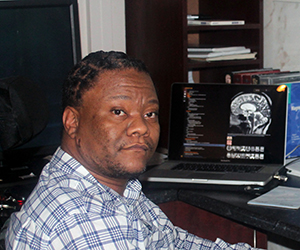Latest News Archive
Please select Category, Year, and then Month to display items
22 September 2021
|
Story Michelle Nöthling
|
Photo Supplied
 Annemarie Le Roux.
Annemarie Le Roux.
“I love working with children.” This is one of the first things Annemarie le Roux mentions when asked to describe herself. This love for children propelled Annemarie into the field of education and she graduated in 2006 with a BEd in Foundation Phase at the UFS. Annemarie immediately immersed herself in the Deaf community, enriching the lives of children at the Thiboloha School for the Deaf in Qwaqwa and the De la Bat School for the Deaf in Worcester.
The academic world enticed Annemarie back to the University of the Free State (UFS) and she was appointed as a junior lecturer in the Department of South African Sign Language (SASL) and Deaf Studies in 2013. Going from strength to strength, Annemarie completed her master’s degree in SASL in 2019, and published an
article earlier this year that she co-wrote with Marga Stander. In this article, they found that SASL “has become an increasingly popular language that hearing university students want to learn as a second language” and subsequently explored different teaching methods used for this emerging group of interested students.
Although now firmly established in academia, Annemarie is still committed to the practical application of SASL. “I am closely involved in student and community engagement through the
SIGNALS Sign Language student association that helps empower the Deaf community and South African Sign Language.” She also interprets for the Deaf community whenever she gets an opportunity, as well as for Deaf students in class and meetings.
On the importance of Sign Language and the recognition of the Deaf community in South Africa, Annemarie believes it will open greater opportunities for development. “More people will be able to learn SASL, and it might even become a subject in school for hearing children.”
Quadriplegic doctor obtains degree against all odds
2016-11-25

Dr Swartbooi faces each day with vigour and
resilience. Dr Swartbooi analyses images on
a screen in the Clinical Imaging Laboratory
at Universitas Academic Hospital.
Photo: Oteng Mpete
Life’s defining moments are when perseverance is rewarded. It is not easy to swim against the tide. However, for Dr Ambrotius Swartbooi from the University of the Free State’s Department of Clinical Imaging Sciences, it became his moment of glory. In 2006, Dr Swartbooi suffered a spinal injury from a near-fatal car accident which left him paralysed and a quadriplegic.
The strength to carry on
“You have one of two choices:
to lie down and give up,
or to pick yourself up”
—Dr Swartbooi
Dr Swartbooi spent close to six months, recovering from his injuries. “You have one of two choices: to lie down and give up or to pick yourself up,” said Dr Swartbooi. He would inspire other patients with similar injuries to reintegrate into society despite their new-found circumstances.
Fortunately, not all was doom and gloom; in 2007 Dr Swartbooi got married, and his wife has supported and inspired him to continue pursuing his dreams. Dr Swartbooi completed his undergraduate medical degree at the UFS, and in 2014 decided it was time to complete his studies and pursued an MMed specialising in Diagnostic Radiology.
To treat or not treat: that is the question
After all his trials and tribulations, Dr Swartbooi will be receiving his MMed Diagnostic Radiology degree at the UFS Summer Graduation ceremony in December 2016. His research focuses on intracranial aneurysm size interventions. He discovered that there were discrepancies between international standards for intervention and African standards for intervention.
The research inspects what should be treated and how it should be treated. He found there was a gap in African literature into the size of aneurysms.
Champion of survival: Where to from here?
“That’s a good question,” said Dr Swartbooi. “Slowly from here. I still need to work on getting my full accreditation from the Health Professions Council of South Africa (HPCSA).” He plans to continue fuelling his passion for teaching. “There is no place better to teach than at an academic hospital.”
Dr Swartbooi commended the efforts of the Centre for Universal Access and Disability Support (CUADS), which assisted him in writing all his exams. “I want to be able to make a fulfilling and lasting impact on people but also to give the best medical service that I can,” concluded Dr Swartbooi.